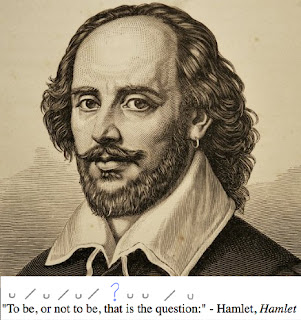Which Shakespeare Reference Sources would most interest you?
Want to learn more about Shakespeare, but not quite sure where to start? One option would be to just learn a little bit about everything (the 6 main categories of Shakespeare reference sources being acting, directing/producing, teaching, historical context, identity, and vocabulary/linguistics). This would give you the most solid foundation.
But if you are not quite sure where to start, below is a quick 2 question quiz to find out what areas you might be most interested in. The quiz will point you to a category of Shakespeare reference and then, in the descriptions of each category, list at least one print and one online source for your exploration.

But if you are not quite sure where to start, below is a quick 2 question quiz to find out what areas you might be most interested in. The quiz will point you to a category of Shakespeare reference and then, in the descriptions of each category, list at least one print and one online source for your exploration.

Acting
Of course, there are many conflicting theories about how Shakespeare's plays can and should be performed. But for some specific but universal acting guidelines, your first stop should be Barton's 1984 TV series, Playing Shakespeare (available for free on YouTube, but the transcription of the series was also made into a book by the same title). Featuring some very famous and experience Shakespearean actors, the well-known scholar delves into his view of the keys, techniques, and challenges of acting Shakespeare. An option in print would be Brine and York's A Shakespearean Actor Prepares, which includes insightful commentary on language, verse, and soliloquy.
Directing and Producing
A quintessential resource and comprehensive stage history of English performances Shakespeare's plays, Jonathan Bate's The Oxford Illustrated History of Shakespeare on Stage includes classic and experimental productions, essays by directors, actors, and academics. The scope of this history includes Shakespearean productions exclusively in Britain, spanning from the 17th to the 20th Century. The 10th episode of the Folger Shakespeare Library's podcast Shakespeare Unlimited centers around interviews with directors, as does this short article, which touches on various aspects of directing a Shakespeare play for a modern audience. The 21st episode of that same podcast deals with the design, production, and other technical aspects of Shakespearean performance.
Teaching
Dr. Rex Gibson, English schoolteacher and academic writer, wrote a number of books on Shakespearean instruction, most notably his 1988 Teaching Shakespeare: A Handbook for Teachers and his 2000 Stepping into Shakespeare: Practical Ways of Teaching Shakespeare to Young Learners, as well as creating the Cambridge School Shakespeare series. Shakespeare's Globe also has quite a few teaching resources (for in-person and virtual teachers, and parents) available on their website. Penguin Publishing also has free available online teaching guides for 18 of Shakespeare's plays in their Signet series.
Historical Context
For information about the context in which Shakespeare lived and wrote, Shakespeare Alive! by Joseph Papp and Elizabeth Kirkland offers both general aspects of the lives of Elizabethans and information specific to Shakespeare. For an larger overview, the British Library also offers a host of articles about 9 key cultural aspects of Elizabethan England, including social structure, amusement, and the supernatural.
Identity (and Authorship)
There are many ways to investigate Shakespeare's identity––and multiple controversial theories surrounding who Shakespeare really was. The tradition idea of Shakespeare, as a real-life male English playwright, is explored in Ducan-Jones' compelling narrative Shakespeare: An Ungentle Life of the Arden Shakespeare series. However, the internet holds many forums on Shakespeare's identity, in fact, the internet holds so many that looking up 'who was Shakespeare' can yield over 228 million results. So the internet can definitely be a good resource for discussion and debate, but must be used wisely and in moderation.
Vocabulary and Linguistics
For a Shakespeare-specific dictionary, the Shakespeare Lexicon and Quotation Dictionary includes every word used in Shakespeare defined in context, as well as full citations of where the word appears. For a more linguistic approach, the Oxford English Dictionary (as well as the online version) includes more etymological information, including roots, languages of origin, archaic definitions and the first known use of any given word in the English language. However, the Oxford English Dictionary is not specific to Shakespeare, so you will have to do more critical thinking to match a given word to its definition than with the Lexicon.



Comments
Post a Comment
All comments are moderated by the Green-Eyed Blogger to avoid spam. If you do not see your comment right away, do not worry; it is simply undergoing our routine moderation process.